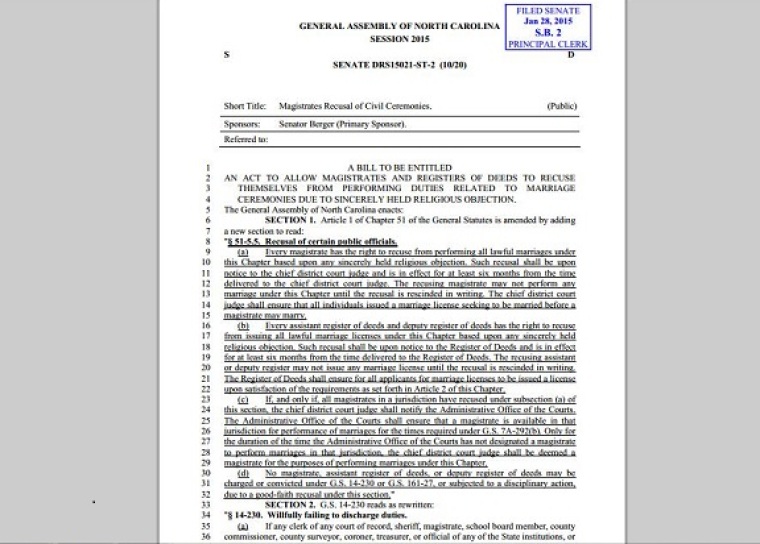No same-sex weddings for North Carolina magistrates

CHARLOTTE, N.C. (Christian Examiner) -- A North Carolina bill intended to provide religious protections to certain public officials who hold religious objections to performing same-sex marriages was introduced last week.
The "Magistrates Recusal of Civil Ceremonies" legislation was filed by State Senator Phil Berger January 28 and to date is co-sponsored by 16 of 50 of his colleagues.
According to Raleigh's local FOX news station, Berger, who also serves as the state senate's president pro tempore, first pledged to introduce the bill after a Rockingham County magistrate chose to resign his post last fall stating his religious beliefs prohibited him from performing same-sex marriages when they became legal in the state. At least six other North Carolina magistrates also resigned due to their religious objections to same-sex marriage.
The bill would provide any magistrate who resigned or was terminated between Oct. 6, 2014, and the effective date of the law to apply for a vacant magistrate position.
"While the courts have expanded the freedoms of some, we must not ignore the constitutionally-protected rights of others," said Berger in a statement. "This bill offers a reasonable solution to protect the First Amendment rights of magistrates and register of deeds employees while complying with the marriage law ordered by the courts – so they are not forced to abandon their religious beliefs to save their jobs."
The bill allows county magistrates and registers of deeds to recuse themselves "from performing duties related to marriage ceremonies due to sincerely held religious objection" and protects them from being charged, convicted or subjected to a disciplinary action, due to a "good-faith recusal."
If passed the bill requires notice of recusal to be delivered to the chief district court judge and would last for at least six months. A magistrate would then be prohibited from performing any marriage until the recusal was rescinded in writing. A register of deeds and deputy register of deeds would be recused of issuing lawful marriage licenses for at least the same time period and until they rescinded their recusal in writing as well.
To protect from the discrimination of any lawful marriage, the proposed law also holds that the chief district court judge must ensure "all individuals issued a marriage license seeking to be married before a magistrate may marry" and even allows the chief district court judge to act as a magistrate if no other magistrate can be found. Additionally, the register of deeds is required to ensure all applicants for marriage licenses are issued a license upon satisfaction of the state's requirements.
The legislation also assigns more than a dozen additional powers to magistrates that would provide alternative civil and criminal administrative duties during the recusal period that would keep them employed. Tasks included issuing subpoenas, taking affidavits and administering oaths.